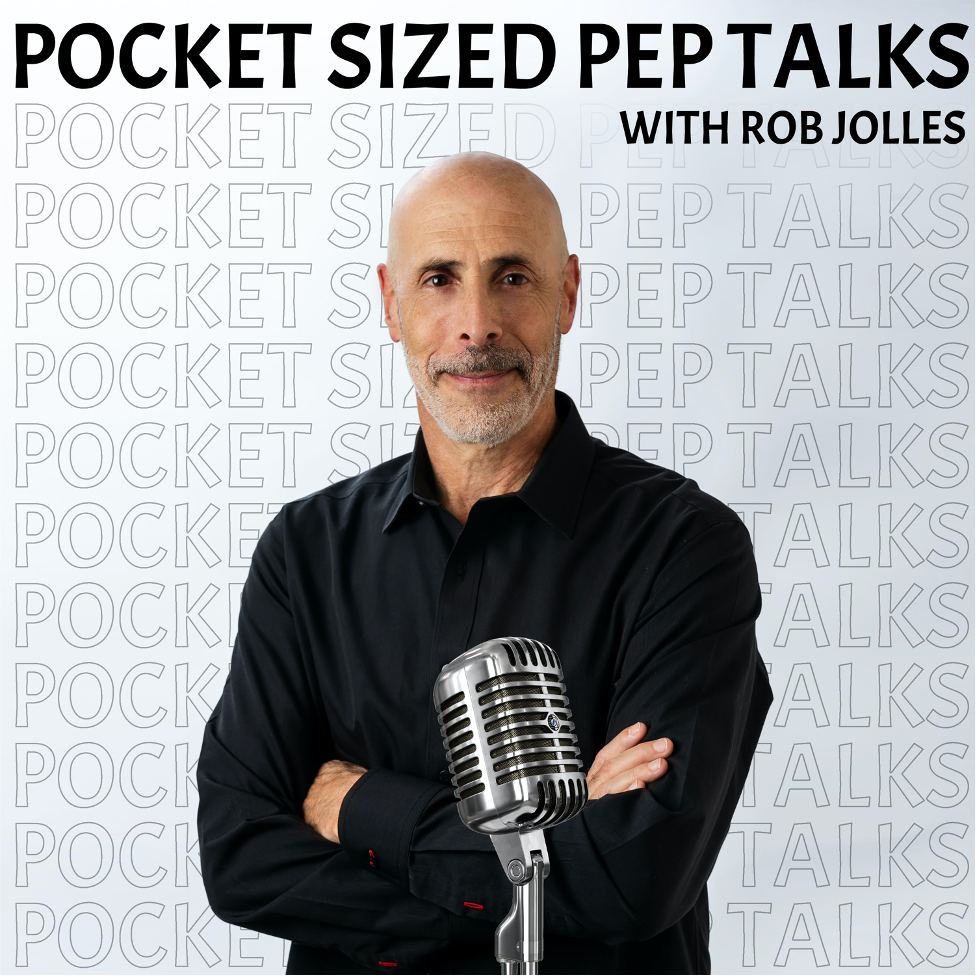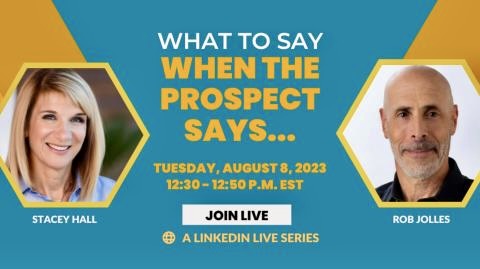Spoiler Alert: You don’t need to say a thing!

Everyone experiences objections when selling. It’s a natural step of the selling process. You need to hear the questions your prospect wants answered, and you need to answer those questions without talking too much when doing so.
When objections are stated, our minds move pretty fast, and unfortunately, often towards a response. Rather than responding, the best move you can make is to ask for clarification of the objection stated. Clarification can be a challenge because it requires you to think quickly on your feet. I would not mention this step if it was not so crucial. How crucial you may ask? I am going to offer you not one, but six, good reasons why you need to clarify those objections!
Reason #1: Get the Real Objection
When working with objections, there is something you have to understand: Rarely will a customer offer his or her realobjection up front. People are funny about their objections and how much they will tell you… if you do not ask. You need to hear more, because once you do, answering the objection will be a whole lot easier. Sometimes, just through a series of clarification questions, the objection will go away without you even having to answer it.
Reason #2: Avoid Answering the Wrong Objection
When a salesperson begins hearing the same objection on a regular basis, they become sensitized to that particular issue. As a customer begins to ask a question in this sensitive area, the salesperson’s mind begins to race ahead. They begin to think, “Oh, no, not this objection again.”
Without listening carefully and without fully understanding the objection, the salesperson begins to trudge mechanically through his or her favorite response. There is only one problem. There are a significant number of times your customer is not objecting to this “sensitive area.” These objections are often the last thing you want to have come up during a sales call. Ironically, it’s you who most often ends up bringing these particular objections up!
Reason #3: Avoid Sounding Confrontational
Another reason to clarify a customer’s objection involves the perception of you, the salesperson. Once an objection has been given, snapping back with an immediate response can be perceived as confrontational. You can create an air of stubbornness and insensitivity when a response to an objection is too fast. Most people don’t like to feel that they are wrong. The quicker the response, the more certain they are that you have not been listening to them. If for no other reason than to avoid the perception of confrontation, clarify the objections you hear.
Reason #4: Buy Yourself Time to Think
I can’t tell you the number of times I observe salespeople not taking advantage of this benefit. Although you can certainly prepare and anticipate objections, they can come up at any time and at inopportune times. Why rush your response? By clarifying the objection, you build time to compose yourself to respond to the objection at hand. A few extra moments to prepare your response can go a long way in finding the correct words to use with your customers.
Reason #5: Shorten your Talking Time
Picture yourself in the customer’s shoes for just a moment. You’re looking at a rather difficult decision and trying to analyze that decision as carefully as possible, and so you ask a question, and out comes a response that just won’t end. You, the customer, start to think something like this to yourself: “This really was not a big deal to me a minute ago, but judging by this response, I must have hit on a key issue.” Please note: The longer it takes a salesperson to answer an objection verbally, the more credibility the objection is given.
For the record, the reason objections are often so difficult to answer is because the salesperson does not know exactly what the objection is! Without clarification, you must verbally address everything about the objection and hope that one part of the response will touch on the customer’s real reason for bringing it up.
Reason #6: Applying the 10% Rule
When a customer wants to stall, they can come up with some very creative objections. There is little backing up these objections. Often times, the customer is just making up excuses, and I would guess this happens about 10% of the time. Coincidently, I would also venture to guess that at least 10% of the time your customer will respond with something like, “Uh, well, you see, I think you actually answered that question earlier.” That’s because when there is no real objection, it’s kind of hard to “tell you more” about an objection that never really existed in the first place.
Contrary to popular belief, objections are a welcome part of any conversation, and an important part of the selling process. In a survey conducted by Xerox some years ago, it was determined that sales calls without at least one objection reduced the chances of making a sale by 24%. I sure hope the reasons I have given you for clarifying objections have convinced you how critical this first step really is. Objections are a prospect’s way of saying, “I don’t fully understand,” and the act of clarifying objections not only gets to the real issue, it gets to the truth.

What do you get when combine energy, enthusiasm… and great content? You get a “Pocket Sized Pep Talk,” and there are now over 275 of them! Tune in and you’ll hear a collection of conversations, interviews, and even some BLArticles® that are sure to teach, motivate, inspire, and oh yes; entertain! https://podcasts.apple.com/us/podcast/pocket-sized-pep-talks/id1497772972

What’s better than one sales trainer? Well, two of course! Join us every other Tuesday for our LinkedIn Live Series at 12:30 pm EST when we bat around different ideas in what we’re calling: “What to say when a prospect says…?” Our most recent tips related to, “What to say when a prospect says, we don’t have the budget for it.”

On September 23rd, 2023, at 2:00 pm EST, my good friend Jay Abraham is having a virtual book launch for his new book, Business Wealth Without Risk. Jay has been a guest on my podcast, and is a business legend.
The launch for his book will be taking place LIVE on Zoom. If you would like to attend:
STEP 1: Register at THIS LINK
STEP 2: Check your email for your login credentials to get your unique referral link.

Excellent blarticle, Rob.
Q: How do you answer a customer who says “Your product does not check all of our boxes”‘?
These are customers looking for an exact fit at every point and will not see beyond their specific wants
.
So, your product does not check all the boxes. My answer usually centers around getting my prospect to look at the big picture of his or her decision. Once we CLARIFY the objection, ask the prospect, “Overall, what’s most important to you; finding someone who can overachieve on 1, 2, 3, 5, and 6, or someone who offers you 4?” I know it sounds a little scary, but as Mick Jagger once sang, “You don’t always get what you want.” Give them what they need Edia. Thanks for posting!
Excellent article, Rob. I’ve been a subscriber for a long time (since we first met at BK Retreat), and you never disappoint!
Well, I disappointed a little because your comment got held up, and I’m just seeing it! So wonderful to hear from you my friend. I’m grateful for the kind words, and hope to see you at another BK retreat soon!!
Very interesting post/points Oobjections are a welcome part of any conversation, maybe is also an inevitable part of life in different areas.
Yes Hui, objections find their way into all sorts of conversations and situations. The key is to seek more information, and by doing so, you stay in control of the conversation. Thanks for posting Hui!
Hi Rob, I am reminded of the first “sales” class I attended way back in 1982. The number one focus was the power of questions when it comes to objections. It was proposed that when you ask clarifying questions, you are really getting to the emotional element of the objection which then will allow you to address the true objection not the one you think you are hearing. Great reminder and I love the 6 reasons why. Helps build the case for why it’s so important.
I appreciate you!
Heff
We’ve known each other for quite some time now… but 1982 is a little too far back! My guess is it was sometime around 1987, but who’s counting?! The fact is, as I’ve said in more than one book, “I haven’t changed my mind.” There is no move that’s more important in objection handling, or selling for that matter, than asking questions and listening. I haven’t changed my mind. Great hearing from you Greg!